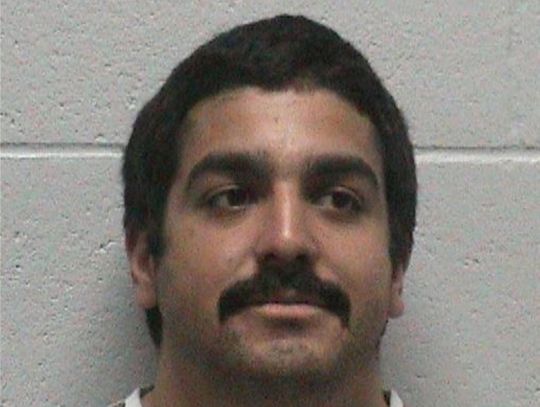Third Judicial District Court Judge Leon Aberasturi on Oct. 7 denied a motion to withdraw a
guilty plea filed by a man who is charged with selling the fentanyl that killed another man.
Joseph Rose Tyler Maciel filed the motion to withdraw his guilty plea to a charge of second-
degree murder on Aug. 1, ahead of his scheduled sentencing on Aug. 4. At that hearing, Maciel
told the court he was requesting to change counsel.
Maciel was arrested April 24, 2024 on charges of distributing a controlled substance that causes
death and fentanyl possession. On December 11, 2023, Lyon County Sheriff’s deputies were
called to a home in the 3700 block of Citrus Street in Silver Springs for a reported overdose. The
victim, Michael Fernandez of Silver Springs, ultimately died.
In January 2024, toxicology test results revealed that Fernandez died of acute fentanyl
intoxication. Investigators alleged that Maciel was the suspect who sold Fernandez the fentanyl
and arrested him during a traffic stop on April 24, 2024.
During the Oct. 7 hearing, attorney Christopher Day argued that Maciel’s previous attorney, Kale
Brock, was unable because of a heavy caseload to dedicate the time a second-degree murder case
requires.
Day cited case law stating that a court may grant a defendant’s motion to withdraw his plea for
any reason where permitting withdrawal would be fair and just. Deputy District Attorney Sean
Neahusan pointed out that also means when permitting the withdrawal would be fair and just to
all parties involved, not just to the defendant.
In a supplemental filing to the motion, Day also stated actual innocence as grounds for the
motion. Day said Maciel and his wife received information from friends saying they believe they
know who sold the likely fatal dose to the victim.
“We believe, with a bit further investigation, we would have admissible evidence in court of the
alleged victim here purchasing from other individuals at around the same time period, thereby
either exonerating my client that’s he’s factually entirely innocent or to that it’s unknown, cannot
be proven beyond a reasonable doubt, who in fact sold the fatal dose here,” Day said.
Day said he believes the court could rest a decision on a specific reason to withdraw the plea,
such as that there was ineffective assistance of counsel while the defendant was entering his plea,
the court could find that the defendant does have a credible claim of innocence or that he’s not
guilty in this case. Third, he said, would be if the judge found that any reason permitting
withdrawal of the plea would be fair and just.
Day called public defender Kale Brock to testify. Brock represented Maciel during the
negotiation of the plea agreement.
Brock, who is the public defender handling cases in Dayton and Walker River justice courts, said
his caseload is probably a little higher than 200 cases, which he acknowledged is a high caseload.
Brock estimated that he spent between five and 10 hours on Maciel’s case prior to the
preliminary hearing. He also estimated another 10 hours of looking at discovery in the case.
Brock testified that when he was assigned Maciel’s case, the district attorney had made an offer
to Maciel that disposed of four misdemeanor charges against Maciel in Walker River Justice
Court. Brock detailed meetings he had with Maciel, his family and other people who were
supporting him and related how difficult the decision was for Maciel to accept the plea.
“But I didn’t distinguish between him just being generally nervous and distraught about what he
was about to go in the courtroom and do versus specifically, not wanting to go forward with it,”
Brock said. “It just seemed like he was nervous.”
Regarding the time he spent going over the plea agreement with Maciel, Brock testified that he
has a routine where he replicates the canvas by the court at the preliminary hearing, asking the
defendant the same questions the judge would ask.
Day asked Brock if Maciel ever mentioned other possible perpetrators or defenses. Brock said he
didn’t remember that, but wasn’t certain enough to say no.
“He didn’t come to me with documents, but he did come to me with concerns,” Brock said. “In
that package of concerns may very well have been a discussion that this individual could have
been using narcotics from other people. I mean, we were both aware that he may have had a
fighting chance at trial.”
Day asked Brock whether he advised Maciel to take the plea.
“Neither of us were under the impression that it was a screaming deal, but after discussing with
me and him and his family, it still felt like that would be the best avenue forward for him, given
the circumstances,” Brock responded. “And I’m not surprised that there’s heartburn over it
because it’s dismissing misdemeanors. It’s not a 50-50 trade.”
On cross examination, Neahusan asked Brock if it would surprise him that felonies were
involved in the dismissal as well. Brock said he recalled them being minor cases.
“But if felonies were clustered in there, given how many of them there were, I would not be
overly surprised,” Brock added.
In response to another question, Brock estimated there were nearly a half dozen status
conferences in the case prior to the preliminary hearing.
“We continued to have status hearings to allow Mr. Maciel to chew on the deal being offered,”
Brock said. “Those status hearings were always to determine whether or not a plea agreement
had been struck.”
Neahusan also asked if it was Brock’s understanding that it was Maciel’s desire to take the plea.
“Yes, it was, and in defense of myself, I wouldn’t have set him up for an arraignment if I didn’t
think that’s what he actually wanted,” Brock said. “I believe that he knew what he was doing
when he entered his plea in the canvas.”
Maciel testified that he mostly met with Brock for about five or 10 minutes each time before
court to go over what they were seeing the judge for that day, for about an hour total. He said
those conversations felt rushed and that he didn’t feel like he had the chance to sit down and talk
with his attorney for as long as he needed.
Day asked Maciel if, during that time, he or his wife received some information relevant to his
case. Maciel said he was told by two people that another person sold drugs to the victim around
the same time.
Maciel said he understood the plea offer to mean he could be sentenced to either 10 years to life
in prison, or a definite term of 10-25 years, in exchange for misdemeanors and a Class C felony
charge being dropped. He said he felt led to believe the penalty could be more severe if he went
to trial.
“I wasn’t aware that if I was tried and found guilty that that’s what I would get anyways,” Maciel
said.
Maciel said he didn’t get a chance to talk to Brock about possible defenses in his case.
“It seemed like he was just trying to push the deal on me every time I would see him before
court,” Maciel said.
On the day he accepted the plea in court, “I feel like I wasn’t aware of exactly what I was doing,”
Maciel said. “He never really went over my case with me.”
Neahusan asked Maciel if he remembered answering the question in court about how many times
he discussed the case with his attorney by saying eight or nine times, if he recalled telling the
court yes when being asked if he had the chance to discuss the charge against him, the facts
alleged in the case and whether he had discussed his legal defenses with his attorney.
“I said yes, because my attorney was telling me to say yes to all this stuff right before,” Maciel
said.
Maciel added that he believes he is factually innocent in the case. When asked by Neahusan if he
was now saying he did not provide fentanyl to the victim, Maciel said yes. Neahusan then asked
Maciel if he lied to the court when he admitted to the charges when entering his guilty plea.
“I said what I was told to say,” Maciel said,
In his final arguments, Day said it’s obvious that Brock physically couldn’t spend enough time
on the case.
“I think that’s, number one, something the court should take very seriously that Mr. Maciel did
not receive adequate representation,” he said.
Day said the Supreme Court has said that a guilty plea surrendered on advice of counsel may be
invalid by showing a manifest injustice through ineffective assistance of counsel.
Aberasturi told Day that in addition to that, he also had to show that there was a reasonable
probability the defendant would not have pleased guilty. Day argued that if that had happened,
Maciel would have had a full and adequate understanding of all possible defenses and possible
punishments.
“The totality of the circumstances here leads to the exact same conclusion, that it would be fair
and just to allow Mr. Maciel to withdraw his plea,” Day said. “The fact that my client didn’t
understand that it couldn’t get any worse than the deal he signed is, I think, evidence enough that
he did not enter his plea freely, voluntarily and knowingly.
Neahusan argued that this appears to be just a case of buyer’s remorse.
“I understand that Mr. Maciel is nervous because he’s facing a long time in prison,” Neahusan
said. “It wasn’t until sentencing date the first time when Mr. Maciel said he didn’t have any
confidence and he wanted to withdraw his plea.”
In addition, Neahusan said Maciel did get benefits from the agreement.
“He did get felonies, gross misdemeanors and misdemeanors dismissed in this case, and some of
those have already been dismissed and cannot be brought back,” he said.
Day argued that Maciel did not have all the information, relationship with his attorney and time
spent on his case that he was entitled to have and asked the court to allow him to withdraw his
plea and set a trial date.
Aberasturi in reviewing the transcript from the arraignment, the defendant did make all of the
required answers to the court’s questions. He also said he found Brock’s testimony credible.
“The defendant knew what he was doing that day. He knew what the charges were. He knew
what the penalty was. He understood he was waiving his right to trial,” Aberasturi said. “He
understood he was waiving all of those rights, and he admitted to providing the drugs and being
the proximate cause of the death.”
Aberasturi said he doesn’t see that counsel’s performance was deficient in that it fell below an
objective standard of reasonableness and prejudice.
“I don’t accept the argument that with more time, things would have been different,” Aberasturi
said. “I think the discussions were had. I’ll also disagree with counsel, I don’t think this was
rushed. This went on for six months, maybe even longer down at the Justice Court. I don’t see
the ineffective assistance of counsel per se. There were several discussions beforehand, and I
don’t see what additional time would have done to change it.”
As to the actual innocence, Aberasturi said the testimony he heard is double hearsay that there is
someone else out there responsible.
“I don’t find the defendant’s testimony credible that he’s now factually innocent, (that) he didn’t
provide the drugs,” Aberasturi said. “I just don’t see enough evidence in the record today to find
that it’s fair and just to undo or allow the withdrawal of the plea.”
Aberasturi set sentencing for Oct. 20.









Comment
Comments